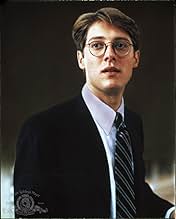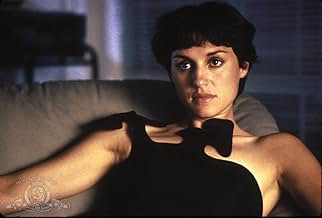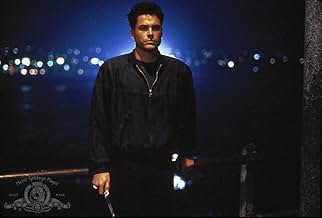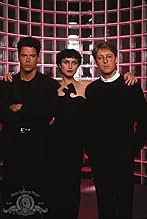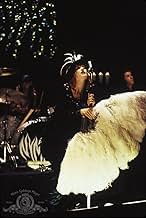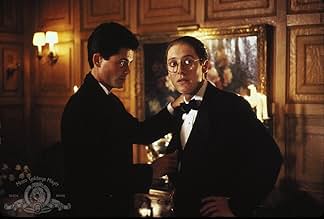Bad Influence
- 1990
- Tous publics
- 1h 39min
NOTE IMDb
6,2/10
12 k
MA NOTE
Doux et peu sûr de lui, un jeune homme se met en danger lorsqu'il tente de rompre sa relation toxique avec un mystérieux inconnu qui prétend être son ami.Doux et peu sûr de lui, un jeune homme se met en danger lorsqu'il tente de rompre sa relation toxique avec un mystérieux inconnu qui prétend être son ami.Doux et peu sûr de lui, un jeune homme se met en danger lorsqu'il tente de rompre sa relation toxique avec un mystérieux inconnu qui prétend être son ami.
- Réalisation
- Scénario
- Casting principal
- Récompenses
- 1 victoire et 1 nomination au total
Jet Freedom
- Band in Club
- (as jet freedom)
Avis à la une
Some people have got that influential touch that can bring any one out of their comfort zone. There are risk takers and those you play it safe. It's matter of personal choice. The clinically dark yuppie thriller 'Bad Influence' takes on a psychological power play between an enigmatically bold drifter (a tremendously venomous Rob Lowe) and a pinned-down marketing analyst (suitably acted by James Spader). Watch how the relationship grows and slowly treads dangerous ground, as the dream of being confident and striving to overcome one's fears is manipulated into a tormented nightmare of aggression and punishment for simple, ungraspable fulfilment for one's own gain. It's a game on someone's life and Lowe's icy portrayal of the controlling puppeteer works effectively. Sure the fundamental storyline isn't anything new (an old formula ala noir going contemporary) and some plot avenues seem a little too glossed over and hard to fathom, but Curtis Hanson's daringly sharp and tight direction cements intense empowerment and morbid curiosity in certain visual suspense. Using an almost voyeuristic approach he draws upon unearthing the violence, drug habit and sleaze trying to hide behind a materialistic obsessive society. Fascinatingly slick and stylish, and the cruise-like pace moves along well enough. The soundtrack has that steamy, on edge kick that doesn't show its age. Also for one in this time period, it's strangely underplayed and kept in the background. The support cast play trumps to Lowe and Spader, but Lisa Zane titillates in her all too short of a role. Fashionably entertaining psycho-thriller.
When you encounter a bad movie, the tendency is to just blow it off. After all, most folks are largely incompetent at what they do. But if you check the credentials of the people involved, you have to think again.
The writer has written successful movies as well as fine ones. "Snake Eyes" is great until the end, a fine examination or watching for us to watch. And "Panic Room" is an experiment in making a building a character.
The director has written and directed films that show he understands the mechanics of noir, the very thing being tinkered with here. Spader has been involved in several noir-bending adventures, always as a contributor.
What went wrong? The pitch certainly would have been "noir personified," specifically by mixing in the "visitor that changes lives" genre. Noir is when a man or couple get accidentally caught up in mischievous fate, fate that seems to actively play with their lives.
A well established derivative is the "omniscient serial killer" genre, which to some extent puts a face on fate. "Funny Games" is a similar experiment in building calmly human dervishes. But it is an entirely different matter to make fate a friend. That's what's attempted here. It may be possible, but not the simple way that's tried.
The minor fold here is that fate uses film (video) in the two events around which the story turns.
Ted's Evaluation -- 2 of 3: Has some interesting elements.
The writer has written successful movies as well as fine ones. "Snake Eyes" is great until the end, a fine examination or watching for us to watch. And "Panic Room" is an experiment in making a building a character.
The director has written and directed films that show he understands the mechanics of noir, the very thing being tinkered with here. Spader has been involved in several noir-bending adventures, always as a contributor.
What went wrong? The pitch certainly would have been "noir personified," specifically by mixing in the "visitor that changes lives" genre. Noir is when a man or couple get accidentally caught up in mischievous fate, fate that seems to actively play with their lives.
A well established derivative is the "omniscient serial killer" genre, which to some extent puts a face on fate. "Funny Games" is a similar experiment in building calmly human dervishes. But it is an entirely different matter to make fate a friend. That's what's attempted here. It may be possible, but not the simple way that's tried.
The minor fold here is that fate uses film (video) in the two events around which the story turns.
Ted's Evaluation -- 2 of 3: Has some interesting elements.
This is the most textbook demonstration of Nietzsche I've ever seen. Rob Lowe is the gifted liar prepared to go all the way to get whatever he wants and keep himself entertained. Spader is the timid, uptight yuppie who doesn't understand just how much he's in for when Lowe's "will to power" rubs off on him. What ensues would bring anybody back to good old fashioned organized religion. A morality play taken to extremes that nonetheless works as a thriller, too. Worth seeing. 8.
I enjoyed this movie very much, which is why it got seven stars from me, but it's by no means a fantastic or transcendent experience. It does it's job as a thriller ably, and it's worth watching.
The good: You do care about the characters, and James Spader and Rob Lowe are both fantastic actors who are on the top of their game here. It's interesting to see Spader play a guy who isn't super cool and self assured for a change, and he handles it well. Lowe channels a bit of Patrick Bateman and creates a great GQ sociopath. The supporting cast is quite good as well, however this could very well have been a two-man film, as you can fit the dialog of all the other characters in the movie combined onto maybe two sheets of paper. The director also had a great eye for style, as the locations, clothing and music were gorgeous and perfectly suited to the era, and gave the film a great deal of authenticity.
The bad: I'm not entirely convinced why Spader was so quick to discard his fiancé (who was beautiful, rich and from all indications a very nice person that cared for him a great deal). The film never really sets up any kind of conflict or apprehension between the couple to justify Spader's truly rash behavior. Yes, I get that he wanted a taste of the bad-boy life that Lowe was a part of, but he seemed to throw it all away far too easily and willingly. For the type of character that he was, I'd expect a little more internal conflict, moralizing and apprehension to go along with a decision like that. It just seems like his descent was inexplicably rapid and left a lot of questions unanswered. Beyond that, I think the ending (or last 30 minutes or so) could have been done a little better.
The good does really outweigh the bad, and the movie is genuinely worth watching if you're a fan of the genre. Don't expect a Michael Mann film, but you can definitely get some solid entertainment value out of it nonetheless.
The good: You do care about the characters, and James Spader and Rob Lowe are both fantastic actors who are on the top of their game here. It's interesting to see Spader play a guy who isn't super cool and self assured for a change, and he handles it well. Lowe channels a bit of Patrick Bateman and creates a great GQ sociopath. The supporting cast is quite good as well, however this could very well have been a two-man film, as you can fit the dialog of all the other characters in the movie combined onto maybe two sheets of paper. The director also had a great eye for style, as the locations, clothing and music were gorgeous and perfectly suited to the era, and gave the film a great deal of authenticity.
The bad: I'm not entirely convinced why Spader was so quick to discard his fiancé (who was beautiful, rich and from all indications a very nice person that cared for him a great deal). The film never really sets up any kind of conflict or apprehension between the couple to justify Spader's truly rash behavior. Yes, I get that he wanted a taste of the bad-boy life that Lowe was a part of, but he seemed to throw it all away far too easily and willingly. For the type of character that he was, I'd expect a little more internal conflict, moralizing and apprehension to go along with a decision like that. It just seems like his descent was inexplicably rapid and left a lot of questions unanswered. Beyond that, I think the ending (or last 30 minutes or so) could have been done a little better.
The good does really outweigh the bad, and the movie is genuinely worth watching if you're a fan of the genre. Don't expect a Michael Mann film, but you can definitely get some solid entertainment value out of it nonetheless.
To me this movie was about a lifestyle. The music in this movie was very underground and featured Skinny Puppy tracks ('Who's Laughing Now?')along with a host of other interesting songs. The main dance-floor scene was very well done and gave a glimpse into the underworld of recreation drugs. Rob Lowe and James Spader delivered convincing roles and were a perfect fit for this cult classic. I'm still looking for the song featured on this movie with the lyrics "I wanna take you down"... It was cool. The movie was cool. Guess you have to appreciate the music at one point in your life to appreciate this type of movie...
regards...
regards...
Le saviez-vous
- AnecdotesJames Spader and Christian Clemenson play brothers in this film. They would star together again in Boston Justice (2004), this time playing colleagues who become good friends.
- GaffesEarly in the movie when Michael is in the bar drinking a beer the glass is nearly empty. When it cuts to Michael getting his head slammed against the table the glass is suddenly almost full.
- Citations
Pismo Boll: It's only a matter of time... get in bed with the devil... sooner or later you have to fuck!
- Versions alternativesUK version is cut by 28 sec. to remove "dangerous imitable technique" during the scene where Alex attempts to kill Michael by connecting the car lights to the petrol tank.
- Bandes originalesSpiritual Healing
Written by Toots Hibbert (as F. Hibbert)
Performed by Toots Hibbert (as Toots)
Produced by Chris Blackwell and Lowell 'Sly' Dunbar (as Sly Dunbar)
Courtesy of Mango Records, an Island Records company
Meilleurs choix
Connectez-vous pour évaluer et suivre la liste de favoris afin de recevoir des recommandations personnalisées
Détails
- Date de sortie
- Pays d’origine
- Langue
- Aussi connu sous le nom de
- Todfreunde - Bad Influence
- Lieux de tournage
- La Brea Tar Pits - 5801 Wilshire Blvd, Los Angeles, Californie, États-Unis(Multiple scenes: Alex and Michael meet at tar pits. Body is found in pits.)
- Sociétés de production
- Voir plus de crédits d'entreprise sur IMDbPro
Box-office
- Budget
- 7 000 000 $US (estimé)
- Montant brut aux États-Unis et au Canada
- 12 626 043 $US
- Week-end de sortie aux États-Unis et au Canada
- 3 822 019 $US
- 11 mars 1990
- Montant brut mondial
- 12 626 043 $US
- Durée
- 1h 39min(99 min)
- Couleur
- Mixage
- Rapport de forme
- 1.85 : 1
Contribuer à cette page
Suggérer une modification ou ajouter du contenu manquant




